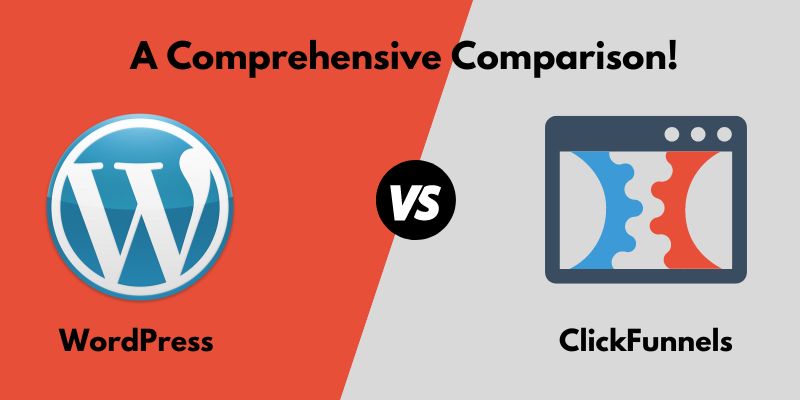
WordPress vs ClickFunnels : A Comprehensive Comparison!
For a considerable amount of time now, systems have been available for creating landing pages, websites, and sales funnels. Many individuals have to decide between WordPress vs ClickFunnels, two strong systems that assist users in creating websites that increase conversions on their digital domains.
With the help of themes and plugins, WordPress is the most customizable content management system available and can be customized to build landing pages and sales funnels that are ideal for generating leads. Popular sales funnel builder ClickFunnels (and its significant upgrade, ClickFunnels 2.0) has developed into an all-in-one website-building tool. A funnel builder, eCommerce, affiliate site builder, email marketing, CRM, and LMS (for online courses) are among the built-in funnel marketing tools. It is difficult to compare with something as modular as WordPress because of this.
To help you choose the best marketing funnel platform for your website, we’ll evaluate the features, pricing, usability, eCommerce, and other aspects of ClickFunnels vs WordPress in this post.
The Cost of ClickFunnels vs. WordPress
Pricing for websites is important. According to WebFX, the typical cost of a professionally designed small-business website ranges from $2,000 to $9,000, with yearly expenses ranging from $400 to $1,200. And when you consider all the essential elements that are included in a contemporary website, it becomes simple to defend those numbers. The goal should be to keep the features and overall functionality of a website or funnel builder as cheap as possible. How do the costs of these two web platforms compare?
What Is The Price of WordPress?
Because WordPress is open-sourced software, you can utilize its fundamental technology for free. Nevertheless, employing it comes with a price. You should budget at least $20 a year for a domain name (Namecheap) and $5 to $75 a month for web hosting (both of which may be obtained from reputable providers like Siteground). The cost of web hosting varies based on the provider and the type of hosting you select, such as dedicated or VPS vs shared hosting. These are the requirements for using WordPress (as well as any other SaaS or self-hosted website platform).
You may buy premium themes and plugins in addition to the expenses of domain registration and hosting. Here’s where you can turn a robust content management system for blogging into a feature-rich funnel builder. Website owners may introduce sales funnels to WordPress.
With alternatives like WooCommerce + WPFunnels, FunnelKit, or CartFlows. For individuals who are just beginning out in this realm, some even provide free solutions. As of this writing, CartFlows’ entry-level package was only $79 annually. Compare that to the $147 monthly cost of ClickFunnel.
Perhaps include a premium WordPress theme (Divi costs less than $300 one-time), a caching plugin (WPRocket costs $59 per year), a contact form plugin (Gravity Forms costs $59 annually), and a variety of additional low-cost or free plugins. Powering a WordPress sales funnel would cost less than $250 annually with an extra one-time payment of less than $300 if you included the domain, hosting, and these sample plugins. With ClickFunnels, all of it is available for just $4 per month for the Basic package.
What Is The Price of ClickFunnels?
Based on scalability requirements, ClickFunnels is a platform that provides organizations with three tiers to select from.
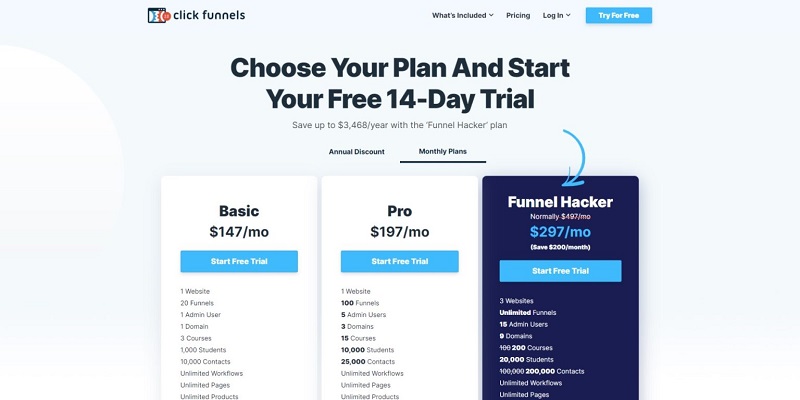
The core ClickFunnels features are included in the $147/month Basic package. It offers three courses, 1,000 students, 10,000 contacts, one domain, 20 funnels, one admin user, and one website. Users receive an infinite number of email sequences, pages, workflows, goods, and basic analytics.
Everything included in the Basic plan is also included in the Pro plan, along with increased use caps and more features. Users may purchase one website, 100 funnels, five admin users, and usage on three domains for $197 per month. In addition, 10,000 students, 25,000 connections, and 15 courses are part of the goal. The Pro plan also includes additional features like ShareFunnels, CF1 Maintenance Mode Plan, API access, Liquid Theme Editor, and the ability to construct affiliate programs.
Last but not least, the Funnel Hacker plan has all the capabilities and greater limitations of the Pro plan. Users may receive infinite funnels, 15 admin users, three websites, usage across nine domains, and comprehensive analytics for $297 per month. 200 courses, 20,000 students, and 200,000 contacts are also included in the proposal.
It’s crucial to remember that, although having a monthly fee, ClickFunnels is an all-in-one sales funnel creation tool that may save you money and time when compared to funnels created using several platforms and technologies. For a premium price, it provides this package and simplicity. With the yearly payment option, the Basic plan would run you around $1,524 annually.
Fortunately, ClickFunnels does provide a complimentary 14-day trial, allowing you to test it out first.
WordPress vs. ClickFunnels: Usability
This is where things start to get interesting: ease of usage. Everything relies on your prior funnel-building skills, which differs greatly from constructing a standard website. It might be challenging either way if you’re unfamiliar with this idea. Below, we’ll go into a bit more information about this.
WordPress Usability
For those who want to create a simple website or blog, WordPress offers exceptional usability. Without any technological expertise, users may simply create and update sites, articles, and media thanks to the platform’s easy interface. But more work goes into setting up WordPress than most newcomers realize. It takes some knowledge (or at least competent direction) to install WordPress, a theme, and plugins as well as to find the best hosting and domain registrar. But it’s not that difficult.
WordPress’ fundamental settings and block editor are quite user-friendly, and there are a ton of online resources available to help you get started. You still have greater freedom to create marketing funnels with WordPress using your preferred drag-and-drop editor or visual page builder, even though creating funnels requires more integrated technologies. For example, you may choose a page builder like Divi to utilize with Cartflows throughout the funnel construction process.
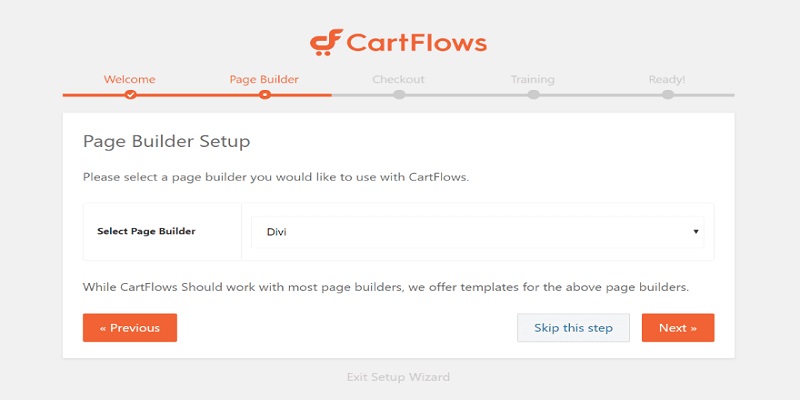
There is definitely more of a learning curve when using WordPress funnel builders (particularly for non-techies). This is how it would be if ClickFunnels was your first platform. You would need to become familiar with the program’s operations. For WordPress, we suggest attempting WPFunnels, FunnelKit, or CartFlows. It’s harder to build eCommerce-powered sales funnels for goods or courses than it is to make a company website. You should anticipate that creating a funnel will need a bit more work (whether using a specialized sales funnel builder or WordPress).
ClickFunnels Usability
Is Simple Because of its simple drag-and-drop interface, even beginners may easily utilize ClickFunnels. The platform provides several prebuilt funnels and templates that may be altered to meet your unique requirements. Additionally, ClickFunnels has a visual editor that lets you create and modify funnel designs in real-time without the need for coding.
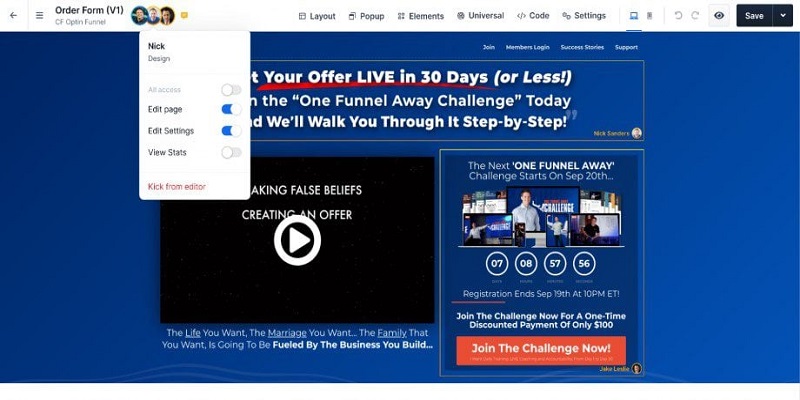
Additionally, ClickFunnels comes with all the tools you’ll probably need. This covers email marketing, funnel builders, and eCommerce functionality. Compared to WordPress, this is wonderful since you don’t have to search for specific plugins to accomplish these functions and then confirm that they all function together flawlessly. However, this also implies that you have fully committed to the ClickFunnel ecosystem; if they omit a feature or two, you will be left without a choice.
ClickFunnels vs. WordPress: Customization
A major feature of many website-building systems is customization. Although it’s difficult to predict what your website will require in a few years, you must have faith that its technology will advance along with you. A variety of customization choices are available with both WordPress and ClickFunnels, but as we’ll see, they appear extremely different.
WordPress Customization
WordPress is an extremely flexible platform that offers countless options for both functionality and style. In contrast to website builder systems such as ClickFunnels, WordPress provides an extensive range of tools, resources, and assistance to assist you in creating the website of your dreams. Its theme library offers dozens of free themes, paid themes, and page builders (like Divi) so you have virtually endless possibilities for extending and customizing your design.
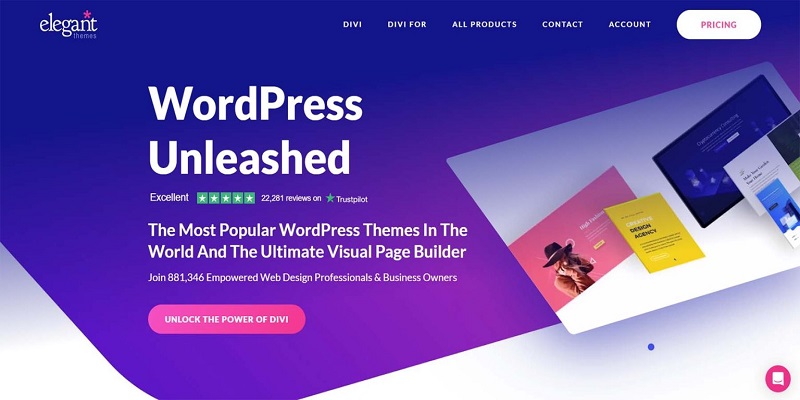
WordPress offers more than 50,000 free plugins for usage in addition to themes. Numerous features, such as forms, social network integration, eCommerce capabilities, email marketing, and much more, may be added to your website by using these plugins. Free and paid plugins may be used to add unique custom features to your website.
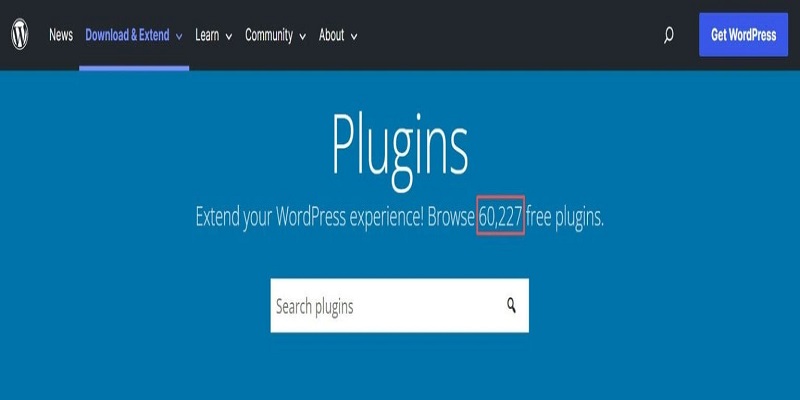
Furthermore, by expanding and changing pre-existing themes with minor CSS adjustments or more complex PHP coding, those with coding abilities may take customization to the next level. You may differentiate your website from the competition by using WordPress to personalize it.
ClickFunnels Customization
ClickFunnels offers very few customization choices. Although the Clickfunnels team has designed its own templates and prebuilt funnels for ease of creation, you are restricted to what they have to offer. Its toolkit, which includes eCommerce, CRM, and funnel creation, is impressive. You are only able to use what they have created, so it’s not like they don’t have any tools.
With regularly used tools, ClickFunnel’s connectors offer more customization and freedom. For example, it integrates with several payment processors and well-known SMS and email marketing platforms. However, as it is a closed environment, there aren’t many integrations. You immediately see that ClickFunnels has considerably fewer possibilities when comparing its potential for third-party connection with WordPress.
WordPress vs. ClickFunnels: Tools for Publishing
WordPress is the standard platform for publishing and blogging when it comes to publishing tools. It caters to bloggers and content makers with a wide range of features and customization choices.
WordPress CMS
You may create and publish material using the editor included with the WordPress content management system. With several formatting choices and the ability to add photographs, videos, and other material, the editor is easy to use and straightforward. WordPress also has the feature of scheduling articles ahead of time, which is useful for companies and bloggers who wish to stick to a regular posting schedule.
Additionally, WordPress interfaces with third-party technologies like social media sharing plugins, SEO plugins, and Google Analytics. With the use of these tools, you can assess the functionality of your website, enhance search engine optimization, and expand your social media following.
The Block Editor in WordPress is a sophisticated content creation and display mechanism. It is far more than just a standard WYSIWYG editing environment. Any kind of block may be utilized to produce exciting, rich material for visitors.
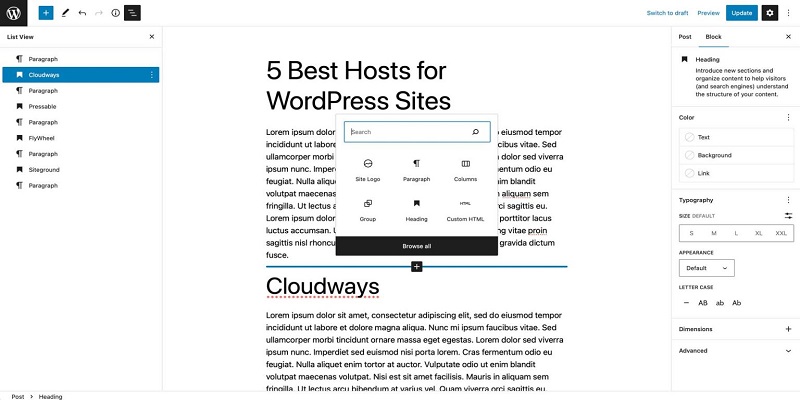
ClickFunnels Publishing
As opposed to WordPress, ClickFunnels offers fewer publishing features and is mostly focused on creating sales funnels. A new blog feature in ClickFunnels 2.0 allows users to write and publish blogs. It offers a straightforward editing interface with minimal WYSIWYG editing that resembles a contemporary-looking WordPress editing interface from 2015.
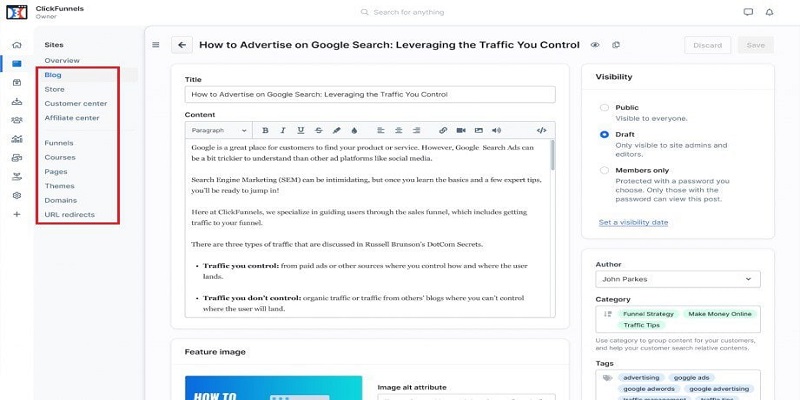
ClickFunnels vs. WordPress: Security
Both ClickFunnels and WordPress provide tools and capabilities for website security. Their approaches to security and the degree of customization available to you do vary, though.
WordPress Security
Since WordPress is a self-hosted platform, you are in charge of making sure your website is secure. WordPress is a safe platform, yet assaults can still happen because of its adaptability. A single plugin or theme vulnerability might expose your entire website to malicious attackers.
That being said, there are a ton of security plugins for WordPress that help improve security. These plugins provide features like firewalls, virus detection, and login security. To fix known vulnerabilities and safeguard the platform, WordPress releases updates and fixes regularly. Additionally, the finest plugins receive regular updates to guarantee that patches are released promptly and are not abused.
It’s crucial to remember, though, that maintaining the security of a self-hosted WordPress website takes more time and effort than with a SaaS platform like ClickFunnels. It is your responsibility to install and maintain security plugins and SSL certificates, among other things.
ClickFunnels Security
Since ClickFunnels is a software-as-a-service (SaaS) platform, your website’s security is taken care of by the company’s staff. Numerous security options are available, such as two-factor authentication and SSL encryption. These elements contribute to the security of your data and website.
You may have peace of mind about website security with a SaaS platform like ClickFunnels since you won’t have to bother about installing and maintaining security measures. It’s crucial to remember that SaaS systems are still susceptible to hacks, so picking a trustworthy platform that puts security first is crucial.
WordPress vs. ClickFunnels: E-Commerce
Both WordPress and ClickFunnels have features and things to consider when it comes to eCommerce.
WordPress E-commerce
WooCommerce and Easy Digital Downloads are just two examples of the eCommerce plugins that WordPress integrates with, making it a powerful platform for building online storefronts. Using WooCommerce, creating an online store, and adding items is simple. Your WordPress admin dashboard has additional menu options after installing the plugin. Similar to creating a new Post or Page, you can create and classify goods. By default, WooCommerce supports several payment channels, including PayPal, Stripe, and EFT.

The versatility that WordPress and WooCommerce provide is one of its advantages. The look and feel of the pages used throughout the purchasing process (checkout, shopping cart, etc.) are completely in your control. Thousands of plugins and themes are available to help you tailor your online store to your own requirements and tastes. For instance, Divi’s robust eCommerce Modules enable the creation of unique online stores.
ClickFunnels E-Commerce
With the eCommerce features included in ClickFunnels, you can create and run an online store without ever leaving the platform. However, in contrast to WordPress, there are fewer customization choices. You can add items and take orders, but you are unable to build an entirely personalized eCommerce platform.
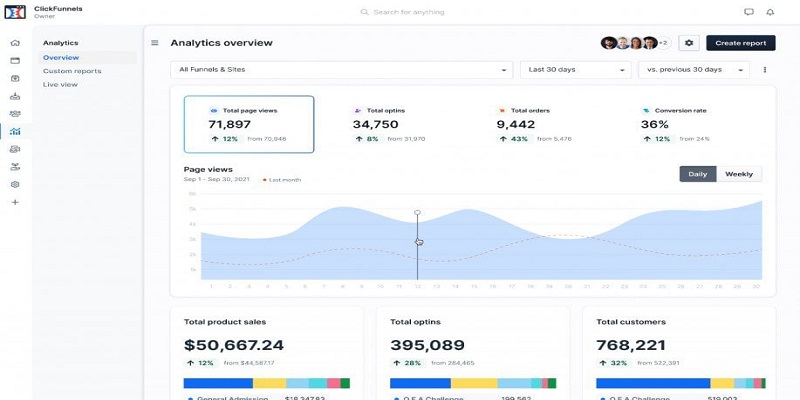
The ease of use that ClickFunnels provides for eCommerce is one of its advantages. The platform is made to maximize conversions from your online business. By handling eCommerce setup and upkeep, ClickFunnels frees you up to concentrate on running your online business on the platform.
FAQs
Let’s address some of your most frequent queries about WordPress and Clickfunnels before we wind up. Have we missed any? Ask a question here, and we’ll get back to you!
What makes WordPress superior to Clickfunnels?
The decision between WordPress and Clickfunnels relies on your requirements and tastes. Both platforms offer advantages and disadvantages. WordPress provides a great deal of freedom and customization, however Clickfunnels is made especially for building sales funnels and making your website convert more effectively.
Is Clickfunnels compatible with WordPress?
Clickfunnels can be used with WordPress, yes. Sales funnels may be created with Clickfunnels and integrated with WordPress websites. You have two options for doing this: you may use the Clickfunnels WordPress plugin or an embed code to add the Clickfunnels funnel straight to your WordPress website. With this connection, you can continue to use WordPress for the functionality and appearance of your website while utilizing Clickfunnels’ robust funnel-building features.
Can your website be replaced with Clickfunnels?
Although Clickfunnels is an effective tool for creating sales funnels, your entire website should not be replaced by it. The main goal of Clickfunnels is to build sales pages and funnels that are geared to turn leads into paying clients. Although you can make a website with Clickfunnels, it might not be as complete as one created using a content management system like WordPress. Therefore, it’s preferable to utilize a content management system like WordPress, which gives you greater freedom and control over the design and functioning of your website, if you require a website with a wide variety of functions beyond merely sales funnels.
Is there a funnel builder for WordPress?
Although there isn’t a built-in funnel builder for WordPress, you can still develop sales funnels with a variety of WordPress plugins. Funnel Kit and WPFunnels are two well-liked choices. These plugins give users full funnel construction capabilities that are optimized for WordPress websites. For funnel creation purposes, WPFunnels and FunnelKit are ideal choices if you want to stay on the WordPress platform and utilize it for your website as well.
Which is more user-friendly, ClickFunnels or WordPress?
ClickFunnels and WordPress have different uses. While ClickFunnels is a specialized tool for developing landing pages and sales funnels, WordPress is a flexible platform for constructing any kind of website. ClickFunnels might be a more user-friendly tool for building sales funnels if you’re searching for something simpler and more intuitive. If you want further control and flexibility, WordPress could be a better solution.
Is ClickFunnels less customizable than WordPress?
Indeed, ClickFunnels is not as configurable as WordPress. With the many themes, plugins, and customization choices that WordPress provides, users may build distinctive and customized websites. On the other side, ClickFunnels offers fewer customization choices and is primarily intended for creating sales funnels. Although ClickFunnels might be simpler for novices, WordPress users of all skill levels can enjoy more flexibility and control.
Which is less expensive, ClickFunnels or WordPress?
ClickFunnels is more expensive than WordPress. Users of WordPress have access to a wide selection of both free and premium plugins and themes on this open-source, free platform. In contrast, ClickFunnels charges a monthly membership cost that is capped at $147. Although ClickFunnels has certain special features, WordPress is less expensive and gives greater customization and flexibility possibilities.
Can a website be replaced by ClickFunnels?
A strong tool for building landing pages and sales funnels that can be used to produce leads and sales is ClickFunnels. Although it can take the role of a regular website in certain situations, it cannot completely replace one because it is devoid of functions like search engine optimization, custom pages, and blogs. Nonetheless, you may enhance the sales funnel experience by integrating ClickFunnels with a website.
A sales funnel: what is it?
A sales funnel is a procedure used to lead a prospective client through several actions to get them to become a paying customer. A call to action, a landing page, and a sequence of follow-up emails or messages aimed at nurturing the consumer and urging them to make a purchase are usually included in the funnel. The objective is to maximize sales for the company while providing a smooth and simple experience for the client.
What benefits does a sales funnel offer?
By assisting leads throughout the purchasing process, a sales funnel assists companies in generating leads and turning them into customers. A sales funnel may lead to greater customer engagement, more income, higher conversion rates, better customer targeting, and more effective use of time and resources. It also enables companies to monitor the behavior of their clientele and adjust their marketing tactics accordingly.
What differentiates a sales funnel from a landing page?
A landing page is a stand-alone webpage created to gather leads or point site users in the direction of a certain action. In contrast, a sales funnel is a sequence of pages and actions intended to lead prospective clients toward a purchase. Each stage in the funnel offers further details and fosters confidence in the good or service being provided. A sales funnel consists of several pages and touchpoints as opposed to a landing page, which is just one page.
Is Clickfunnels compatible with WordPress?
By adding Clickfunnels opt-in forms, buttons, and pop-ups to your WordPress website, you can integrate Clickfunnels with WordPress. To guarantee a flawless user experience and expedite the integration procedure, you may also utilize a plugin like Clickfunnels WordPress Integration. This allows you to utilize WordPress as your website platform with Clickfunnels’ funnel-building features.
Conclusion
If you want more price than ClickFunnels or want extensive customization, we advise you to explore WordPress. Although using WordPress to create sales funnels may require more work than using ClickFunnels, this extra effort can be justified as genuine sweat equity that keeps you from having to pay ClickFunnels’ exorbitant fees. For those just starting out who are presumably not completely monetized, this is especially perfect. When you are still developing your business, why spend more? Nevertheless, it wouldn’t harm to check whether ClickFunnel is a better fit by utilizing their free trial.
You can also read our related articles: